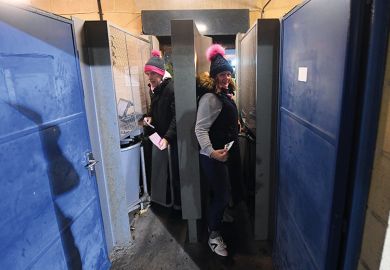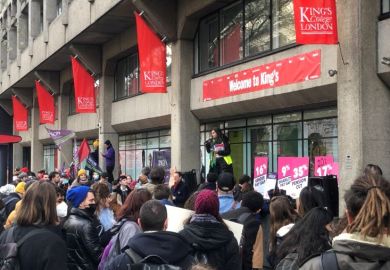The University of East Anglia has announced plans to make staff redundant and cut departmental budgets, blaming a “deteriorating financial situation” caused by falling student numbers and the tuition fee freeze.
The research-intensive institution is projecting a deficit of £23 million for 2023-24 and fears this could rise to £37 million in three years, according to an all-staff email sent by vice-chancellor David Richardson and seen by Times Higher Education.
Professor Richardson says the situation is “serious” and plans need to be put in place to address the shortfall and secure long-term financial stability for the university, which is known for its health sciences research and leading creative writing department.
He says the university’s current situation has been caused by a lower-than-expected intake of students for the academic year 2022-23 as well as a higher-than-average dropout rate and a £5 million rise in energy costs in the last year.
“We need to take action now to ensure that we don’t breach the current agreements on our bank loans. If that were to happen, we could face even higher interest rates which would make an already difficult situation even worse,” Professor Richardson writes, adding that such a scenario could also be investigated by the English regulator, the Office for Students.
Faculties will be asked to reduce their budgets because of the difficulties and professional services departments will also be cut by between 10 and 20 per cent.
As a result, “adjustments” may be made to some of the university’s courses, Professor Richardson says, and overall staff numbers are set to be reduced via a programme of compulsory redundancies. A ring-fenced budget reserved for staff rewards is also set to be “put on hold”.
“The university has worked hard to safeguard roles by reducing non-pay related budgets, but this is no longer sustainable,” UEA said in a statement. “Unfortunately, this means that it is unlikely all savings can be made without compulsory redundancies.”
Michael Kyriacou, a lecturer in humanities who chairs the local University and College Union branch, said he did not accept the reasons given for the redundancies, as they did not explain why student numbers had declined at UEA, when they had not at similar institutions.
Instead, he said, there had been “systemic mismanagement” of the institution. “These external factors are not unique to UEA but UEA has uniquely failed to weather them. All boats are in the same storm but why is ours on the rocks? You have to blame those in charge,” he said.
While the number of staff whose jobs may be at risk had not yet been revealed, Dr Kyriacou said if the redundancies are on a scale that is feared, it would “put the institution into a death spiral”.
“Already staff are overworked for our current levels of students and if you are going to cut significantly the numbers of academic staff, there is no way this institution can function,” he added.
UEA said it would continue to work closely with the campus trade unions during the period and provide support to anyone who needs it.
“UEA is a world-leading institution with an international reputation for research and teaching, but we need to adapt and change to the world around us,” Professor Richardson said.
“As a university, I know we will work together to evolve and grow through these difficult times to ensure we have securer financial foundations and a positive vision for our future success.”
Several universities have similarly announced plans to cut back on staff spending and course portfolios in recent months. The Westminster government recently confirmed the long freeze on tuition fees would be extended for a further two years until at least 2024-25 despite fears its value is being eroded by the rapidly rising rate of inflation. University leaders have said many undergraduate courses are now becoming loss-making.
Register to continue
Why register?
- Registration is free and only takes a moment
- Once registered, you can read 3 articles a month
- Sign up for our newsletter
Subscribe
Or subscribe for unlimited access to:
- Unlimited access to news, views, insights & reviews
- Digital editions
- Digital access to THE’s university and college rankings analysis
Already registered or a current subscriber?










